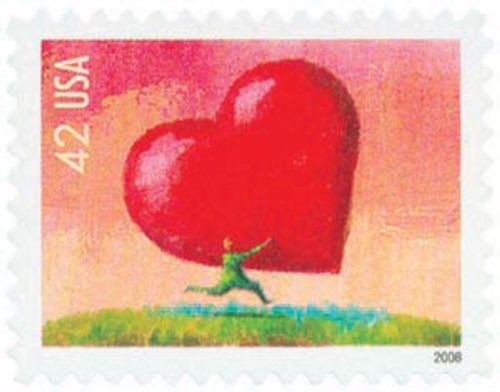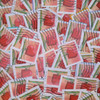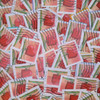
# 4270 - 2008 42c Love Series: All Heart
2008 42¢ All Heart
Love Series
Issue Date: June 10, 2008
City: Washington, DC
The stylized heart shape is the universal symbol for passion and love. There are many theories that seek to explain how the heart shape came to represent love. One cites the use of the now-extinct silphium plant and the Greek city-state Cyrene in the seventh century B.C. The silphium plant, which had heart-shaped seeds, was said to be an effective method of birth control.
During the Middle Ages, philosophers and scientists believed the heart was the seat of thought, reason, and emotion. Early examples of the heart shape can be found in cultures worldwide, dating back several hundred years. In his 1665 memoir “Travels in India,” jeweler Jean-Baptiste Tavernier describes a 32-carat heart.
During the 1700s, the Asante people of Ghana used heart-shaped symbols on hand embroidered Adinkra clothes to represent the concepts of love and wisdom. The use of hearts to symbolize romantic love flourished in the Victorian age.
Today, stylized pink or red hearts adorn gifts given as a token of love and friendship. Heart-shaped boxes of chocolate, engagement rings, and fresh-cut flowers are popular choices for birthdays, anniversaries, and St. Valentine’s Day.
The 2008 “Love: All Heart” stamp is a reminder that love is often the most cherished gift of all. The 42¢ commemorative stamp is part of the “Love” Series.
2008 42¢ All Heart
Love Series
Issue Date: June 10, 2008
City: Washington, DC
The stylized heart shape is the universal symbol for passion and love. There are many theories that seek to explain how the heart shape came to represent love. One cites the use of the now-extinct silphium plant and the Greek city-state Cyrene in the seventh century B.C. The silphium plant, which had heart-shaped seeds, was said to be an effective method of birth control.
During the Middle Ages, philosophers and scientists believed the heart was the seat of thought, reason, and emotion. Early examples of the heart shape can be found in cultures worldwide, dating back several hundred years. In his 1665 memoir “Travels in India,” jeweler Jean-Baptiste Tavernier describes a 32-carat heart.
During the 1700s, the Asante people of Ghana used heart-shaped symbols on hand embroidered Adinkra clothes to represent the concepts of love and wisdom. The use of hearts to symbolize romantic love flourished in the Victorian age.
Today, stylized pink or red hearts adorn gifts given as a token of love and friendship. Heart-shaped boxes of chocolate, engagement rings, and fresh-cut flowers are popular choices for birthdays, anniversaries, and St. Valentine’s Day.
The 2008 “Love: All Heart” stamp is a reminder that love is often the most cherished gift of all. The 42¢ commemorative stamp is part of the “Love” Series.











